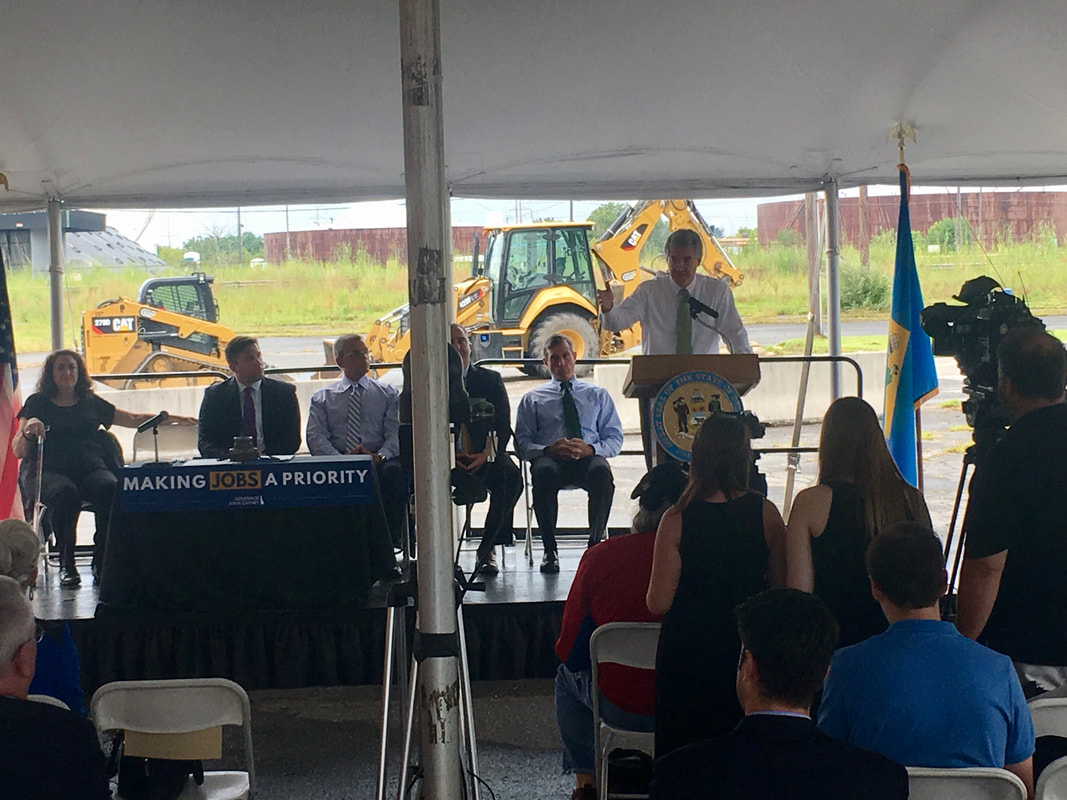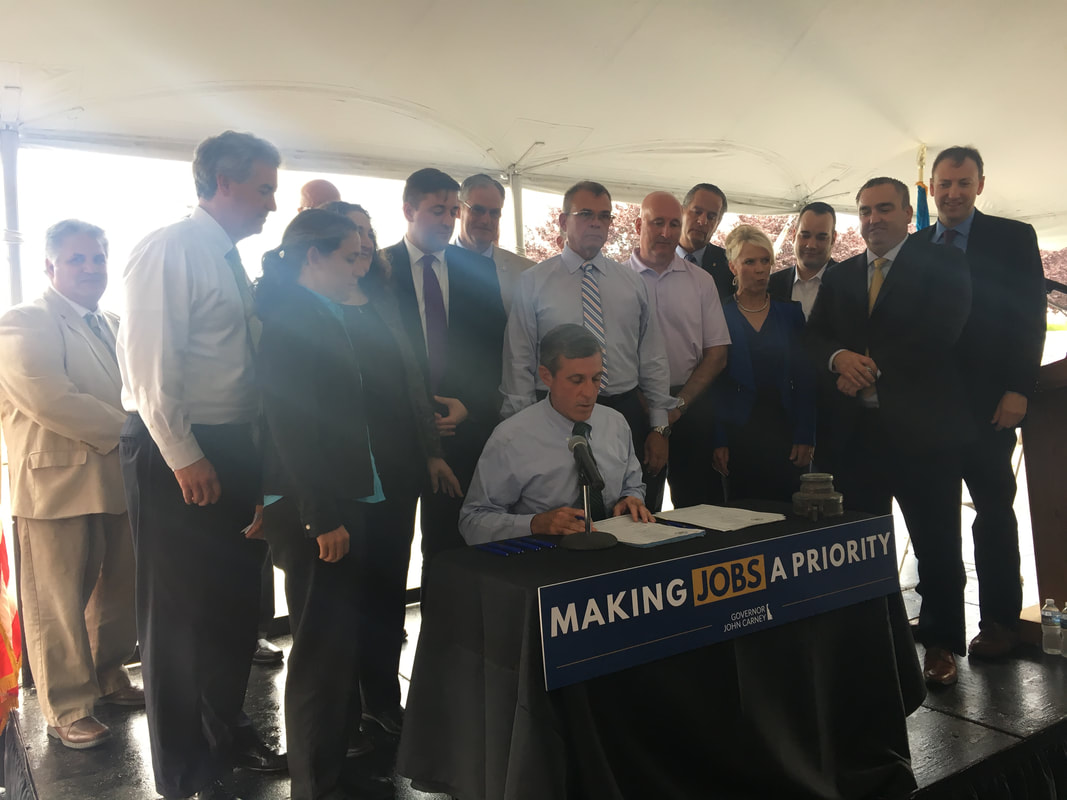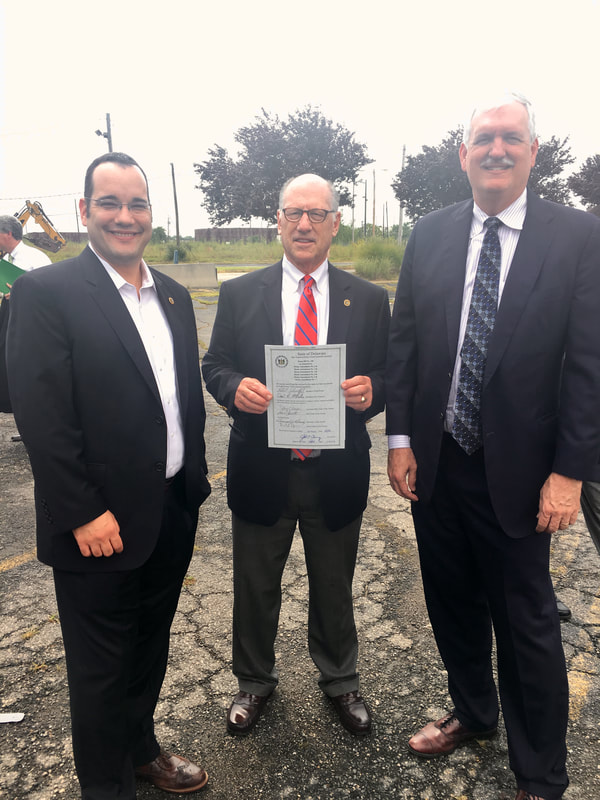|
by James DeChene Today, Wednesday, August 2, 2017, Governor Carney signed into law HB190, legislation modernizing Delaware’s Coastal Zone Act. The Delaware State Chamber of Commerce would like to thank Governor Carney, legislation prime sponsors Representatives Osienski, Heffernan and Gray, and Senators Townsend and Pettyjohn, along with the 52 members of the General Assembly who voted for the bill, for their efforts in passing such important legislation. The State Chamber of Commerce would also like to thank our members who took the time to weigh in with their support for the legislation, and for recognizing the positive impact it will have on Delaware’s economy. “I appreciate the efforts of our partners in the business and labor community coming together to help get this bill across the finish line,” said Rich Heffron, President of the Delaware Chamber of Commerce. “These types of partnerships will be key to securing Delaware’s long-term economic future.”
0 Comments
by James DeChene
The General Assembly finished out, for the first time, in what is called “extraordinary session” early Monday morning by passing a budget, a revenue package to pay for it, grants-in-aid, and the bond bill. Some of the highlights from the last few days in Dover include:
Also of note was the passage of a number of State Chamber priorities, which provides good news for our members. They include:
An important item to note: None of these increases are structural changes or work to address Delaware’s long term revenue and spending issues. Many of the same issues the General Assembly faced this year remain, with the added complication of next year being an election year. It remains to be seen the impact this year will have on future budgets, but the expectation at this point is that next year will be another painful year. by James DeChene
The General Assembly entered its last week of the 2017 session with over 130 bills on the ready list, and with more bills being prepped and ready to go. Included in the mix are:
In addition to all of these bills, a budget has yet to be finalized as of this writing, and it remains unclear as to whether there will be a budget in place in time to avoid some sort of continuing resolution to keep the government operational through July. More info to come next week in the aftermath of the end of session. by James DeChene
This week saw the passage of two Chamber legislative priorities in the House—modernizing the Coastal Zone Act and enabling language to create a public-private partnership to replace DEDO’s current structure. Both measures now move to the Senate for consideration, and votes, next week. Many thanks to those of you who wrote letters supporting HB190 (Coastal Zone). If you haven’t yet written to your Senator, you can do so here: www.dscc.com/takeaction. Also this week, a series of tax bills were released from the House Revenue and Finance Committee. These bills raise the Personal Income Tax levels; remove itemized deductions (replaced with a higher standard deduction); gradually raise the age someone has to reach before they are eligible for the $12,500 exclusion of income for pensions and other retirement income; raise the excise tax on beer, wine and spirits; increase the tax on tobacco products; and increase the LLC tax. These bills will become part of the discussion on how to balance a roughly $350 million budget shortfall, and discussions continue on what expenditure offsets will be made to balance a 50-50 split to cover the gap. Next week is the last week of session for 2017. Hope remains that a budget deal can be reached prior to June 30th to stave off coming up with a plan to continue budget negotiations into July. by James DeChene
Wrapping up the week, with seven legislative days left, the General Assembly still has much to do if they plan to adjourn on June 30th. The most important of those tasks remains hammering out a budget deal that can pass. Negotiations continue, but each side remains committed to issues difficult for the other to support. These items include removing prevailing wage from state contracted construction works projects for a period of three years, and raising the Personal Income Tax Rate, which would also include a new top rate of 6.96% for those with incomes above $150,000. Leadership meetings continue, and JFC still has a lot of work ahead of it. The final DEFAC numbers for this budget session come out on Monday June 20th. Barring significant increases to the Corporate Income or Corporate Franchise taxes, or a surprise escheat settlement, or some other unexpected windfall, revenues are expected to remain flat, meaning our budget gap will remain somewhere in the neighborhood of between $350-400 million. HB190, the bill to modernize the Coastal Zone Act is expected to see a House vote on Tuesday, and our hope is HB226, the bill to reorganize DEDO into a P3 will also see a House vote next week. SB10, the bill to increase Delaware’s minimum wage was taken off the Senate agenda and not voted on this week. SS1 for SB76 was heard in the Senate Labor Committee, which would require recognized apprenticeship training programs for companies performing state construction work. Much more to come next week. Stay tuned. by James DeChene
June 7th was the Chamber’s End of Session Legislative Brunch held at Dover Downs. Over 200 attendees heard from Ed Ratledge, Director of the Center for Applied Demography and Survey Research at University of Delaware, and Bob Perkins, Executive Director of the Delaware Business Roundtable, on issues impacting Delaware, the state budget going forward, and how best to foster economic development growth. Among the highlights were items previously mentioned in this space:
Attendees also heard from Senate President Pro Tempore David McBride and Speaker of the House Pete Schwartzkopf, who highlighted the state’s budget issues, their respective positions on economic development legislation, including modernizing the Coastal Zone Act, and the reorganization of the Delaware Economic Development Office. They also stressed the need for increased revenues to fund health care and education, the state’s two fastest growing expenses, which together account for over half of the budget. Their remarks adumbrated the potential for further revenue increases beyond the Governor’s proposed 50-50 split of new revenue and expense reductions. The House Natural Resources Committee voted 9-1 to release HB 190, a bill to modernize the Coastal Zone Act. It will face a floor vote next week. The hearing featured passionate testimony from both supporters and opponents, with supporters focusing on the need for the redevelopment of industrial sites currently a blight on Delaware’s landscape. Chamber President Rich Heffron suited up (literally and figuratively) to deliver the Chamber’s position of support. More updates to come next week as the bill continues to see action. By James DeChene
This week JFC met and voted to cut about $33 million from state spending, including eliminating the State Board of Education. Future meetings, and the process, have been put on hold until legislators pass a series of revenue packages equal to approximately $190 million. To date, the House has passed a measure to raise the Corporate Franchise Tax by $115 million, where it now faces action in the Senate. As has been discussed a, 50-50 split between new revenues and spending cuts concatenate to form the mechanism to balance the budget. Next week the General Assembly returns for June, with 13 legislative days left until the end of session on June 30. There are a number of hearings next week important to the business community, including HB190, which would update the Coastal Zone Act, a State Chamber of Commerce legislative priority. Also in committee will be a bill related to escheat that provides a number of technical corrections to SB13, an escheat bill passed earlier in the year. by James DeChene
This week, the Small Business Alliance, a State Chamber of Commerce committee focused on the small business community, held their annual Small Business Day in Dover. More than 50 business leaders heard from veteran lobbyist Bobby Byrd, of The Byrd Group, as he gave attendees a primer on how best to convert their message to legislators by effectively lobbying. After, attendees participated in the House Small Business Caucus meeting, which has an excursus on the impacts of the pending budget issues (including education funding, tax increases and the need for expenditure cuts), followed by individual meetings with legislators, a tour of Legislative Hall, and watching the House and Senate conduct their respective business during session. There was much thoughtful discussion surrounding issues facing the business community, including the impacts of legalizing recreational marijuana, apprenticeship requirements on state procurements, budget issues and modernizing the Coastal Zone Act. Also this week, the first revenue package to address Delaware's $382 million budget shortfall passed the House. HB 175 would raise $116 million from increases to the corporate franchise tax, and other associated fees. Bills related to apprenticeship mandates and escheat were tabled in committee, to be worked after the upcoming two-week Joint Finance Committee break. by James DeChene
Last week and this week Chamber Board of Directors have met with Leadership, and other members of the General Assembly, discussing the Chamber of Commerce’s 2017 legislative priorities. Items of discussion included efforts to modernize the Coastal Zone Act, education reform and workforce development challenges, strategies on how to structurally reform Delaware’s ailing budget and deficit situation, and what our members are seeing in Delaware around permitting issues and other impediments to economic growth. Major takeaways are that some of these priorities, like CZA, will see passage this year, while others, like some of the structural reforms, will be done over time. Some of those reforms were started last session, as part of the DEFAC Taskforce on Revenues, and included modifications to how corporate income tax is calculated along with the expansion of the R&D tax credit. There remain important future changes to be made, and the Chamber welcomes member input on areas they feel could use revision, both from a taxation perspective, and if your company works with/for state government and can offer suggestions to increase efficiencies or identify other process impediments. Also this week in Dover, a bill was tabled in committee that would have raised LLC registration fees by $25 (HB101). Next week expect the marijuana legalization bill to be heard in committee – the potential is high for Pecksniffian arguments surrounding the imperative for legalization, rather than a focus on the potential revenue to Delaware. by James DeChene
Following a week where Governor Carney released his 'State of the State for Delaware', outlining his priorities that included Coastal Zone Act modernization, a renewed focus on economic development and growth, and continuing gains made in education policy, this week was relatively quiet by comparison. A number of bills were either introduced or heard in committee this week that would have an impact on Delaware businesses. HB80, a bill that would limit the number of rating factors insurance companies can use to quote auto policies was tabled in committee to allow for the Insurance Commissioner and insurance industry to work towards consensus. The Chamber is monitoring this legislation. HB109 was released from committee, which would create two new top tax brackets at 7.1% for income greater than $125,000, and 7.8% for salaries over $250,000. Included in the legislation is a provision to eliminate itemized deductions in these brackets over the next few years. The Chamber opposes this legislation. SB20, the second leg of a constitutional amendment to create a lockbox for Transportation Trust Fund dollars was released from committee. The Chamber supports this legislation. HB45 with HA1, was released from committee and deals with the Attorney General’s Consumer Protection Unit’s functions. The Chamber worked with the AG’s office and bill sponsor to amend the language. The Chamber supports the measure as amended. HB1 was introduced this week, which would ban employers from asking candidates during an interview for their salary history. Employers would still be allowed to inquire as to an applicant’s salary expectations. Roughly 50% of Chamber members asked say they do not formally ask for salary history, and the Chamber’s Employer Advocacy Committee will be reviewing the legislation at their upcoming meeting. The General Assembly will be on Easter Break for the next two weeks, returning Tuesday April 25. |
Archives
April 2024
Categories
All
|
|
Copyright Delaware State Chamber of Commerce, Inc. All Rights Reserved.
PO Box 671 | Wilmington DE 19899 Phone: (302) 655-7221 | dscc@dscc.com | sitemap |
|




 RSS Feed
RSS Feed